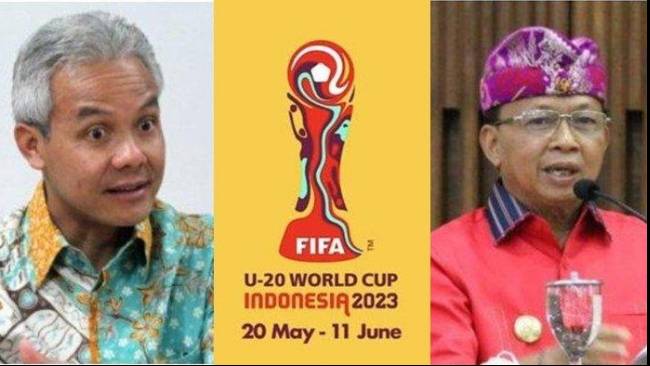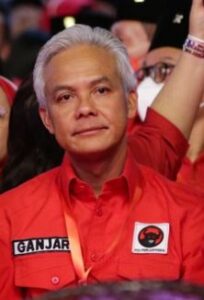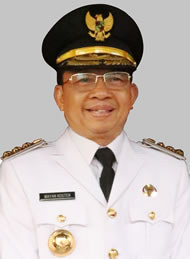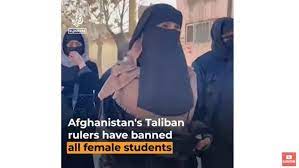
Ganjar Pranowo-I Wayan Koster. Foto has taken from Kompas TV
STRATEGIC ASSESSMENT. According to John McBeth, journalist and author, a fortnight after Megawati’s opposition to Israel’s participation sabotaged Indonesia’s hosting of the FIFA Under-20 World Cup, pollster Indonesia Survey Institute (LSI) has given Prabowo, 71, a four-point lead over Central Java governor Ganjar Pranowo, the prospective PDI-P candidate.
Political fallout has swelled from FIFA’s decision to strip Indonesia of hosting rights for this year’s Under-20 soccer World Cup, threatening the front-runner status of a potential successor to President Jokowi. Public opinion has turned sharply against government officials seen as ruining the dreams of the soccer-loving country’s young players.
Central Java Governor Ganjar Pranowo is seen as one of the potential leading candidates in Indonesia’s February 2024 presidential election. He and other Muslim conservatives expressed opposition to Israel’s participation, spurring protests. When FIFA, soccer’s global governing body, announced on March 29 that it would pull the tournament from the country, public reaction was swift.
Ganjar’s rhetoric against Israel’s participation was widely regarded as an attempt to score political points. In order to run in the election, he needs to be nominated by his party, the ruling Democratic Party of Struggle. The party has had a historically strong anti-Israel stance, and some observers say it was behind the push to exclude the country from the tournament.

Having already refused to host the Israeli soccer team at the U-20 FIFA World Cup in Bali, Bali Governor I Wayan Koster has now barred a sports delegation from the Jewish state from taking part in the World Beach Games scheduled for August this year.
Koster used the same argument that Indonesia did not have diplomatic relations with Israel as the justification for his latest decision. “This decision is based on the Constitution. Second, we refer to Foreign Affairs Ministry Regulation No. 3/2019,” said Koster, referring to the ministry’s ordinance governing its conduct with local administrations in the country.

Part III of the foreign ministry’s regulation stipulates that a local government in Indonesia can only engage in international cooperation with a foreign country if the country in question has a bilateral relationship with Indonesia. Koster also based his latest decision on the banning of displays of Israel’s national flag and the playing of the country’s national anthem on Indonesian territory.
The parochial focus of electorates is often lamented because it’s a supposed barrier to governments’ embrace of internationalism and global cooperation. But a ‘what’s in it for us’ attitude on the part of the voters can keep governments honest — making sure the political conversation and politicians relate to tangible outcomes of policy choices rather than the warm and fuzzies.
The tensions between symbolic victories and practical outcomes is a theme of this week’s lead article, in which Liam Gammon reviews the political fallout from the cancellation of Indonesia’s hosting of the FIFA U-20 World Cup. After local politicians criticised the inclusion of the Israeli team — invoking security risks and Indonesia’s long-standing support for the Palestinian cause — FIFA lost confidence in Indonesia’s ability to host the tournament and pulled its host rights, just weeks before the tournament was set to begin.

Indonesians are no fans of the Israeli government, with sympathy for the cause of the Palestinians arising from a sense of religious solidarity and anti-colonialism. Indonesia maintains quiet and informal economic and defence relationships with Israel but the idea of recognising the Jewish state is a political no-go zone for now, especially given the intensifying brutality of Israel’s occupation of Palestinian territories.
It would seem that the politicians decrying Israeli participation in the tournament were on a winner. But as Gammon writes, they misjudged the Indonesian electorate’s comparative enthusiasm for symbolic victories versus bread and much loved circuses. Notwithstanding the sincere concern many Indonesians have for the Palestinian cause, bread and circuses won the day.
According to Dr. Burhanuddin Muhtadi, Visiting Fellow in the Indonesia Studies Programme at ISEAS – Yusof Ishak Institute, and Senior Lecturer at Islamic State University (UIN) Syarif Hidayatullah, two Indonesian Democratic Party of Struggle (PDI-P) cadres, Bali Governor I Wayan Koster and Central Java Governor Ganjar Pranowo, are now the targets of Indonesia’s mainstream and social media after the International Federation of Association Football (FIFA) stripped Indonesia of its host rights to stage the 2023 U-20 World Cup.
There were rumours surrounding the security of the tournament following the Bali governor’s citing of the 12 October 2002 bombing attacks in Bali and the trauma suffered by the Balinese as the main consideration behind FIFA’s decision. These were unfounded – FIFA’s official statement mentions “current circumstances”, no doubt referring to the anti-Israel protests of last month which marred Indonesia’s image of tolerance and gave rise to real doubts about the security of the youth footballers.
PDI-P’s politicians have made two key miscalculations. The Israeli team had qualified for the U-20 Cup as early as in June 2022. The government could have easily predicted that local resistance (to Israeli youth footballers playing in Indonesian stadiums) would come from certain Islamic parties and groups that have been vocally anti-Israel.
But a recent report revealed that the centre of opposition to Israel’s participation in the U-20 Cup ironically came from the ruling party, PDI-P. While President Joko Widodo is not the party’s leader, party chair Megawati Sukarnoputri either cut him out of the loop regarding Koster and Pranowo’s anti-Israel rhetoric or worse, the president misread the party dynamics and could not set things right to ensure Indonesia retained its host rights.
The latest Tempo magazine scoop revealed the behind-the-scenes chronology of the PDI-P’s move to reject the Israeli youth soccer team. Megawati reportedly summoned one of her confidants on 13 March to quietly issue the official party line.
All PDI-P governors of provinces where the U-20 soccer matches were scheduled had to publicly reject the Israeli team. Within days of this alleged decision, party cadres I Wayan Koster and Ganjar Pranowo, one of the frontrunners for the 2024 presidential race, did just that.
One of Indonesia’s soccer fans said the cancellation of U20 world cup in Indonesia because the blunder of statement of both PDIP cadre, Ganjar Pranowo and I Wayan Koster including PDIP Secretary General Hasto Kristiyanto, because of that it can be predicted that 50% of Indonesia’s soccer fans which have right to chose in 2024 general election are going to decide not give their vote to PDIP and Ganjar Pranowo. “Personally, I do not trust with SMRC latest survey results related to Ganjar Pranowo’s electability rebound. Many of pollster institue have political preference and political stands. They are not free role player. Big power groups should be protected behind them,” he argue further.







